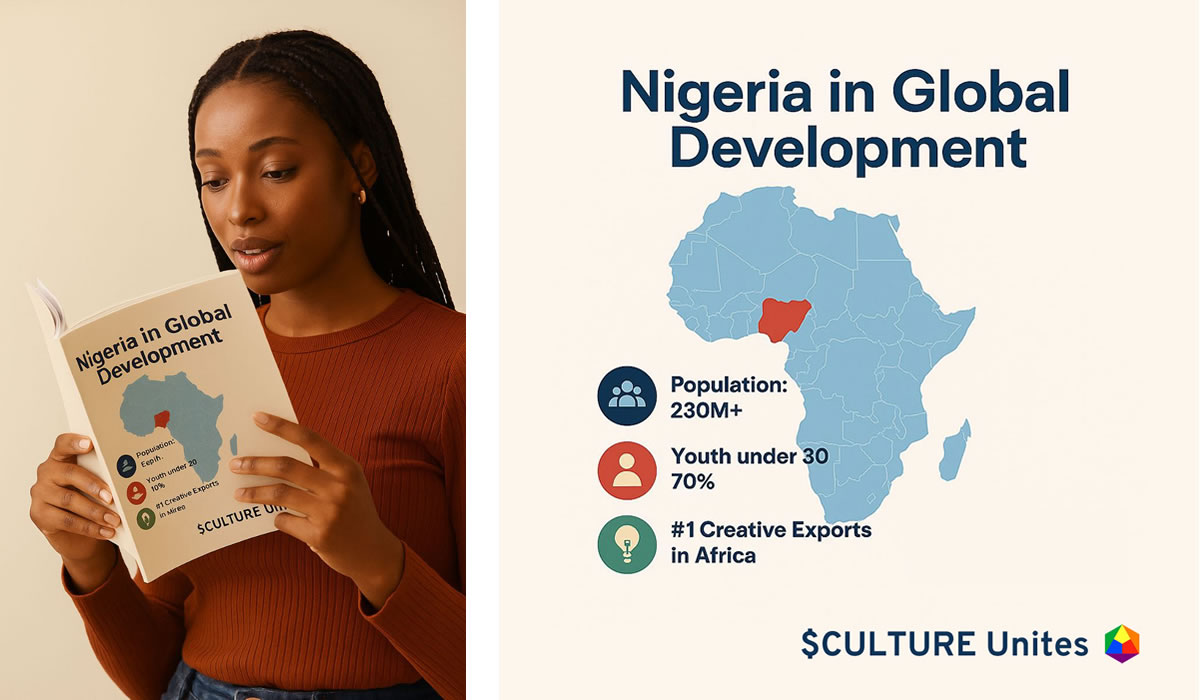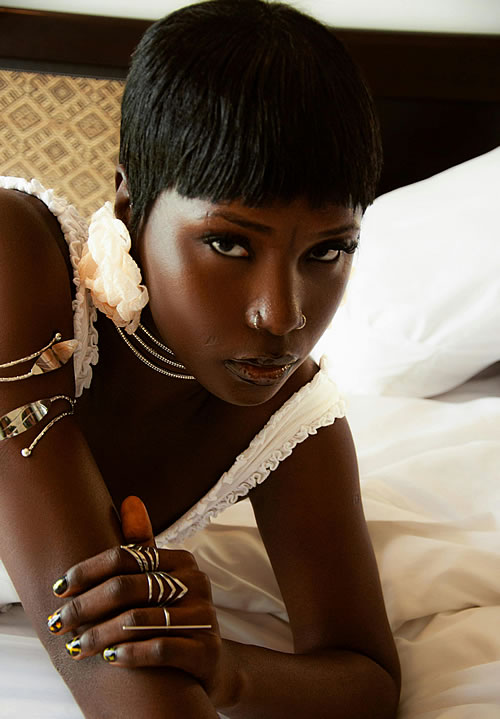
Art direction by Amani Xolani
Nigeria: Africa's Rising Export Powerhouse and Creative-Tech Giant
NG
In the bustling markets of Lagos, where the rhythmic beats of Afrobeats spill from speakers and film crews navigate through crowds with the same determination as oil tanker drivers heading to port, a remarkable transformation is unfolding. Nigeria has emerged not just as a major exporter on the African continent, but as a nation reshaping what it means to export culture, creativity, and cutting-edge technology to the world.
The Numbers Tell a Compelling Story
Nigeria’s export prowess reached new heights in 2024, with total exports valued at $38.8 billion, creating a substantial trade surplus of $14.2 billion. While crude oil remains the backbone of these exports, accounting for the majority of Nigeria’s export value, the country’s economic narrative is rapidly diversifying into realms that would have seemed impossible just a decade ago.
Africa has become Nigeria’s largest export destination, creating a powerful continental trade network that extends far beyond traditional petroleum products. This shift represents more than mere geography—it signals Nigeria’s role as a continental leader, exporting not just commodities but ideas, innovations, and cultural products that resonate across African markets.

Where Nollywood Meets Silicon Valley
The story of modern Nigerian exports begins in the creative corridors of Nollywood, where filmmakers armed with digital cameras and boundless imagination built what is now a $7 billion industry. But this is where the traditional narrative takes an unexpected turn. Today’s Nollywood is embracing digital technologies, harnessing the power of data, AI, and emerging platforms to reshape storytelling and audience engagement.
Picture a filmmaker in Abuja who no longer worries about traditional distribution channels or piracy concerns. Instead, they’re utilizing blockchain technology to protect their intellectual property and tokenize their films, creating new revenue streams through decentralized finance platforms. Filmmakers can now tokenize their films, creating digital assets that represent shares in their movie projects, which they can sell to investors on decentralized marketplaces.
This isn’t science fiction—it’s happening right now in Lagos tech hubs where creative professionals and blockchain developers collaborate in spaces that buzz with the energy of African innovation. The intersection of creativity and technology has become Nigeria’s new export frontier, where traditional boundaries between entertainment, finance, and technology dissolve into something entirely new.
The AI Revolution Takes Root
In the gleaming offices of Nigeria’s emerging tech districts, artificial intelligence isn’t just being adopted—it’s being localized, adapted, and reimagined for African contexts. Nigeria has launched ambitious programs to train 1,000 citizens yearly in artificial intelligence, blockchain, and other technologies, with the goal of competing with countries that invest billions annually in research and development.
The vision extends far beyond mere technical training. Organizations are leading the charge in localizing and scaling AI across Nigeria, collaborating with stakeholders to craft solutions for diverse sectors while blending international standards with homegrown innovation. This represents a fundamental shift from technology import to technology innovation, where Nigerian developers create AI solutions that address uniquely African challenges.
Consider the Lagos-based startup that develops AI-powered platforms for informal market traders, or the Abuja tech company creating blockchain solutions for land registry systems. These aren’t adaptations of Silicon Valley innovations—they’re original solutions born from Nigerian creativity and addressing real African needs.
Government as Catalyst for Creative-Tech Fusion
The Nigerian government has recognized that the future of exports lies not just in oil reserves but in human creativity enhanced by technology. The National Council for Arts and Culture has launched the Creative-Tech Framework, establishing a roadmap for 2025–2030 that aligns with the National AI Strategy and targets a $25 billion creative industry.
This isn’t merely policy on paper—it’s a comprehensive vision that sees Nigerian musicians using AI to create personalized fan experiences, Nollywood producers leveraging blockchain for transparent royalty distribution, and tech entrepreneurs building platforms that export African creative content globally. The framework recognizes that Nigeria’s greatest export potential lies in the fusion of its creative genius with technological innovation.
Beyond Traditional Exports
While traditional exports like cocoa have shown remarkable growth of 244.4%, and Nigeria maintains its position as a major petroleum exporter, the real story of Nigerian exports in 2025 is being written in recording studios where artists collaborate with AI composers, in film sets where directors use blockchain to fund independent productions, and in tech incubators where developers create platforms that will power Africa’s digital economy.
The entertainment industry is embracing NFTs and blockchain technology, with 2025 expected to see wider adoption across creative sectors. This represents more than technological adoption—it’s the emergence of new export categories that didn’t exist in traditional trade classifications.
Nigeria’s Export Future Looks Bright
Nigeria’s leading African export position transforms completely. Natural resources no longer define the story. Instead, human creativity amplified by technology takes center stage.
Lagos musicians create more than Afrobeats. They build digital platforms exporting African culture worldwide. Nollywood filmmakers produce more than movies.
Furthermore, they pioneer decentralized film financing and distribution models. Nigerian blockchain developers do more than code. They create financial infrastructure powering Africa’s economic integration.
Additionally, AI researchers study more than algorithms. They develop solutions addressing poverty, healthcare access, and educational challenges continentally.
This defines Nigeria’s new export story. The country exports innovation, creativity, and technological solutions. These reflect 200 million people’s ingenuity perfectly.
A Kaduna farmer uses blockchain-verified supply chains. A Port Harcourt musician reaches global audiences through AI platforms. An Enugu filmmaker finances projects through tokenized crowdfunding.
Nigeria ranks among Africa’s top exporters certainly. However, tomorrow’s most exciting exports won’t measure in oil barrels. They won’t count in cocoa tons either.
Instead, they’ll measure global impact. Nigerian creativity enhanced by cutting-edge technology creates this impact. The world hungers for authentic African innovation.
Sources and References
- Nigeria Export Data 2024 – African Development Bank Trade Statistics
- Nollywood Industry Revenue Report – PwC Entertainment & Media Outlook 2024
- Nigeria National AI Strategy Document – Federal Ministry of Communications and Digital Economy
- Creative-Tech Framework 2025-2030 – National Council for Arts and Culture
- African Trade Statistics 2024 – African Union Commission
- Nigeria Technology Training Programs – National Information Technology Development Agency (NITDA)
- West Africa Creative Industries Report – UNESCO 2024
- Nigeria Blockchain Adoption Study – Binance Research 2024
- African Export-Import Bank Annual Report 2024
- Nigeria Bureau of Statistics Trade Data 2024
Additional information available at:
- Nigerian Export Promotion Council: nepc.gov.ng
- National Information Technology Development Agency: nitda.gov.ng
- Creative Economy Development Fund (CEDF): cedf.gov.ng

